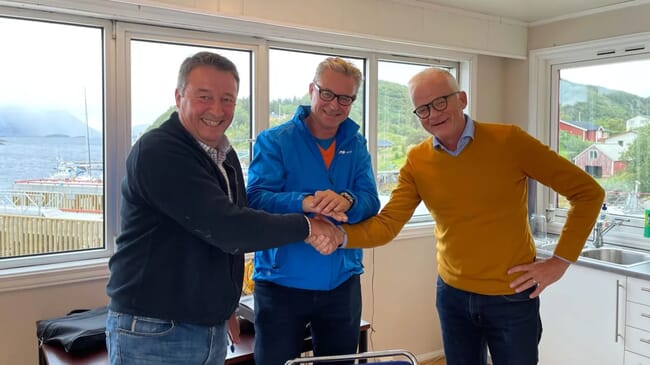
The Norwegian Minister of Fisheries and Seafood Odd Emil Ingebrigtsen (centre) congratulates Cermaq's Knut Ellekjær (right) and Folla Alger's Tarald Sivertsen (left)
The agreement aims to develop kelp into a raw material for salmon feed and will also see the two companies test a new system for the integrated production of salmon and seaweed.
“We want to contribute to developing a new industry and provide environmental benefits, but also jobs and ripple effects. That is why we are very happy to start the project together with Cermaq, which is a driving force on climate and the environment,” said Tarald Sivertsen, chairman of Folla Alger, in a press release.
The recent climate report from the UN strengthened the urgency to take measures that can reduce greenhouse gas emissions in line with the 2°C target set in the Paris Agreement. Aquaculture and seafood play an important role in the green shift, and algae can both reduce emissions and be an alternative raw material in feed.
Some of the nutrients released from salmon cages are water-soluble. These nutrients will fertilise the algae and lead to increased carbon capture.
“Algae are part of the green shift, and we have great faith in algae production as a future industry. This is also the reason why we have included SINTEF, NOFIMA, Nord University and NTNU as leading research environments on how we can develop kelp production,” said Knut Ellekjær, managing director of Cermaq Norway.
The goal of the research project is to test in full scale a new type of plant for integrated production of salmon and kelp. Along the way, the project will look at how the nutrients from the salmon cages are taken up in the kelp, how the kelp production affects the aquatic environment in the cages, and what effect the integrated production has on the health of the fish in the cages.
In addition, the project aims to develop kelp into a new feed raw material for salmon.
“Integrated salmon and kelp farming enables us to both utilise nutrients around the farming cages as a resource, and provides alternative feed raw materials. It is good circular economy, and will help reduce the footprint from salmon farming,” said Ellekjær.
Cermaq has also been engaged in kelp production in BC, Canada through co-production trials with several First Nations, to pilot commercial kelp production. The projects were led by North Island College’s Centre for Applied Research.




